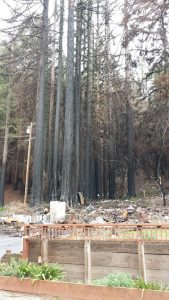My last post, I talked about fostering a puppy (who has since gone on to his furever home, huzzah!). And I thought, “okay, I’m going to take a break from all that, for a while.”
And then an email landed from the other shelter I volunteer with, and without hesitation I said, “I can take Bella.”
Bella is a six-year-old Pomeranian mix, a delicate little lady with the spine of a dragon (when a friend’s Great Dane pup got too close, she opened her little mouth and showed her little teeth, and told him to get fucked. He backed down.). We call her the cat-dog, because all she really wants is to cuddle, ideally and preferably in my lap, but she is perfectly happy to trot alongside Max for nearly an hour on our walks.
(and then she demands to be carried, like the princess she is).
It hasn’t been all snuggles and walks, though. Her first few days, her tummy was stress-upset, and I spent a lot of time washing shit out of her fur. Her housebreaking broke (also due to stress) and I spent a lot of time cleaning carpets. And recleaning carpets. And throwing out soiled pee pads (and keeping Max from eating the fresh ones). Sweet Bella is demanding of my time, to the point where Max started to get cranky about it. And god help you when you tried to crate her at night! Her place was on the bed with you, thank you very much.
(Once she regained her house training, she got to sleep on the bed, yes).
And then she had to have dental surgery, and I spent four days trying to convince her that yes, she did need to take all her meds…. Trying to get a tiny dog to swallow a pill is not like pilling a larger dog. Their mouths are so tiny and you feel guilty AF for even trying.
But she’s still the sweetest bundle of fierce fluff, and I love her dearly.
I said that in conversation recently, and got another round of the usual, “I don’t know how you can bear to foster, and then let them go. I’d end up adopting all of them.”
As I said to that friend: no, you really wouldn’t. And no, we’re not saints for doing this. I joke that having a third animal in the house for a short period of time is how I remind myself that one dog and one cat is the perfect balance for this household. More than that, and chaos is set loose. Chaos, and exhaustion. But more than that, the truth is that with animals, as with people, loving someone doesn’t always mean you want to keep them.
As you read this, I’m bringing her back to the shelter to meet with prospective adopters. I have all my fingers and toes crossed that they will be a perfect match, and Bella will be going to her furever home, to spend the rest of her life loved and comforted and allowed to sleep on the bed.
And then I’m going to take a break from fostering for a while.
And this time I mean it!
EtA: Bella did in fact charm her potential humans, and their resident dog, and went home with them this evening. <3.

 Black Sun, by Rebecca Roanhorse (Saga)
Black Sun, by Rebecca Roanhorse (Saga)
 House of the Patriarch, by Barbara Hambly (Severn House)
House of the Patriarch, by Barbara Hambly (Severn House)



 As 2021 drew to a close I realized that I had fallen into a scam I hadn’t heard of: befriending a person on social media and then inducing them to set up a GoFundMe for a medical emergency. Fortunately, I came to my senses before I sent any money from that campaign. Until then, it had never occurred to me that I had been manipulated over a year and a half. As embarrassing as the experience was for me, I’m going public in the interests of educating others.
As 2021 drew to a close I realized that I had fallen into a scam I hadn’t heard of: befriending a person on social media and then inducing them to set up a GoFundMe for a medical emergency. Fortunately, I came to my senses before I sent any money from that campaign. Until then, it had never occurred to me that I had been manipulated over a year and a half. As embarrassing as the experience was for me, I’m going public in the interests of educating others.